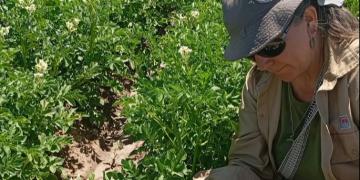Canadá: Farmers caught up in fight over chemicals
The herbicide Roundup contains gylphosate, which a California jury ruled has contributed to a dying man’s cancer.

It’s fair to say that Canadian farmers are feeling a little shell-shocked after not one, but two, decisions in the space of one week that could fundamentally change their access to chemical weed control.
First was the California jury’s decision to award US$289 million to a man dying of cancer after deciding his exposure to the commonly used herbicide glyphosate contributed to his condition and that product labels did not adequately warn him of the risk.
The verdict will be appealed and the case could drag on for years. But the decision is expected to open the floodgates on an estimated 5,000 lawsuits alleging something similar. At what point do the multiple owners of products containing this herbicide decide the liability is too great on a product that is gradually losing its effectiveness anyway?
The second was a decision announced this week by the Pest Management Regulatory Agency, a division of Health Canada, to phase out neonicotinoids, a class of insecticides widely used in canola, corn, soybeans and horticultural crops.
These insecticides first came under scrutiny because of their link to unusually high losses of bees and other pollinators. But it is their impact on aquatic insects that are critical food sources to fish, birds and other animals that led to the decisions announced this week. Again, these findings will undoubtedly be challenged during the 90-day consultation prior to the agency’s final ruling.
Reaction from the farm community is a mix of incredulity and outrage. Decisions like these are widely seen as yet another attack on the good folks that produce our food.
It is nothing of the sort, but it’s understandable how farmers would see it that way.
Farmers regularly use these products and like the results they get; they firmly believe the value they bring is well worth the financial, health and environmental risks.
They trust the regulatory system that has reviewed the scientific data and concluded benefits outweigh the risks — until of course, that same regulatory system changes its mind, as is the case with the PMRA’s reversal of its stance on neonics. There they see the science as suspect.
Many farmers believe they won’t be able to farm if they lose these products, which is a bit of a stretch. Scientists have been warning for years that agriculture’s "chemical addiction," as some now openly refer to it, is unsustainable.
The continued escalation of weed and insect species now resistant to pesticides has made it imperative that farmers move away from such heavy reliance on chemicals and sharpen other agronomic techniques such as crop rotations and integrated pest management practices.
However, it is fair to say pest control is more complicated without any access to these products. Yields may be compromised and ultimately, food more expensive. Just ask organic farmers.
There’s the rub. Does it have to be all or nothing? As with anything, the intensity of use affects its toxicity.
It’s hard to imagine that farmers’ access to weed-control options might be influenced by a California jury consisting of people off the street. Unfortunately however, this was the predictable result of the industry’s approach to public engagement.
Despite all the hype about earning the public’s trust, there are some glaring inconsistencies in the messaging over the years.
The industry has argued these products, when used appropriately, are incontrovertibly safe. Yet when they wanted the public to embrace genetically modified crops, one of the selling points was that these crops would mean farmers would use fewer pesticides.
People have been asking questions about glyphosate for years, but scientists who published research looking into these questions have had their methods, data and conclusions challenged. Yet the data used to obtain regulatory approval for these products is considered proprietary and not available for public or even peer reviews.
The mistake was in thinking farmers are the customers. They may buy these products, but in the end, it’s consumers and taxpayers that determine how — or even if — they are used.
The legal and regulatory systems are the ultimate courts of public opinion — and they have spoken. The impact on farmers and consumers is simply collateral damage.
Fuente: https://www.winnipegfreepress.com/business/farmers-caught-upin-fight-over-chemicals-491168001.html




